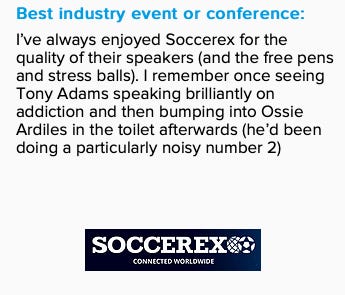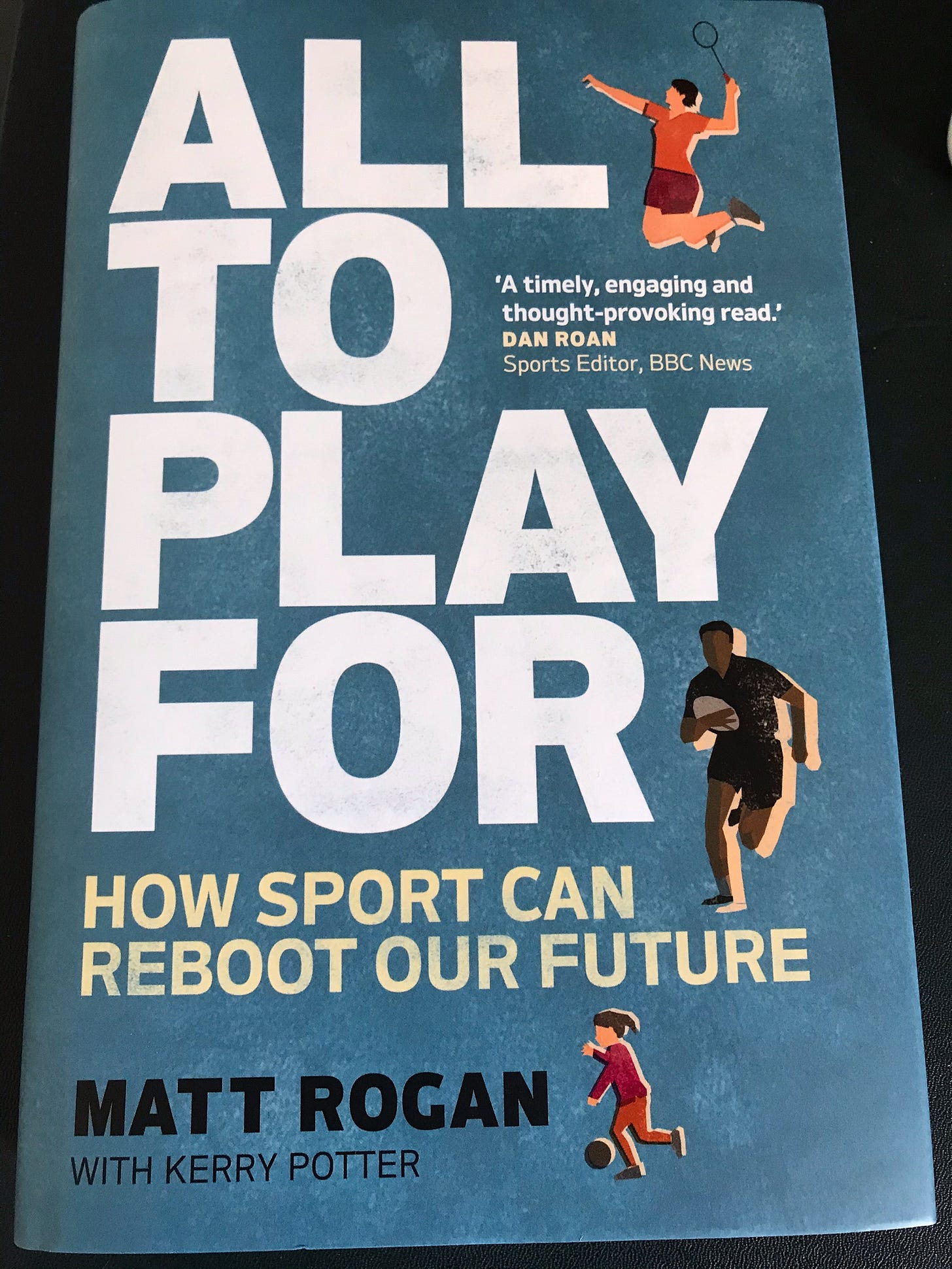Headhunting for beginners; Life's sweet in the C-Suite; Nando's to the winners; The 200k Club; Comp Comp and the Passion for Sport tax; Purpose safari; The fans are revolting; What's Infantino up to?
The newsletter of the podcast
‘Winners get Nando's, losers get Chicken Cottage’
Gundeep Anand created The Last Stand street football competition and now needs your support to get a women’s event going.
Talking to him (UP Pod #160) got me excited about football for the first time in a while (Caveat: I’m a Spurs fan).
You can feel the influence of gaming culture in the way he describes football.
…with street football you get characters, and you get the best out of them because there's freedom, there's expression, there's creativity, there's equality. And with 11 aside, I think they dumbed down all these things and they make players robots.
Connecting the dots:
Gundeep Anand: The first one was in Shepherd's Bush and it was amazing, literally from idea to execution in like two months and we had the whole of underground street football scene going crazy…if you connect with people that everyone's forgotten about, they really, really care, they really appreciate you. And I think that's what I did. I never made anything new. All I did was connected the dots.
I said, Hey, I'm doing, I'm looking to do a top street football tournament where the winners get Nando's, the losers get Chicken Cottage. Do you wanna play?
It made me think of Nick Bitel’s comment about The FA’s relationship with five a side leagues (UP Pod #136).
Nick Bitel, outgoing chair of Sport England: Governing bodies have to recognise the value of innovation and embrace it. I’m afraid far too often they’ve failed in that regard. For many years Parkrun was entirely looked down upon by the athletics governing bodies. There’s a famous story told of when Powerleague 5 a side football went to see The FA years ago, and said, ‘Let’s work together’. The FA said 5 a side wasn’t the game, the game is eleven a side on grass. Not only did they refuse to work with them, they actively changed the rules to make it harder for referees to officiate a five a side game.
See also: The FA’s five year strategic plan
C-Sweet: 11 things on sport’s management class I thought about while talking to Paul Nolan about jobs and search
Sport is a bubble. I’ve often wondered if sport is more insular than other industries. So much of the conversation is about change - digital, media, audience behaviour, tech, data, blah blah - which is often framed as them and us, old v new, outside v inside. Paul Nolan (UP Pod #163) was himself headhunted from industry by the then new CEO of The FA, Adam Crozier in 2000. His view on Crozier was interesting, defining him as the classic outsider. Despite being quite good at football (trials, amateur club game veteran etc) Crozier was deemed by many, including the media, as not ‘a football person’ because he’d come from ‘outside’, in his case running Saatchi and Saatchi. This was sold as a huge plus point, right up until it wasn’t. In some ways, Crozier’s FA tenure was ahead of its time (like Martin Peters - Google it).
Change is hard. Many big, sports bodies are invested in maintaining the conditions that made them big and successful in the first place, and members of the organisation are incentivised to keep the status quo. The result is inertia and the new entrant battles 'the way things are done around here'. This inertia can look a lot like complacency.
Too fast, too soon. When things go wrong, outsiders are vulnerable to the accusation of fetishising change (see Crozier above). But if they spend too long before changing something, they’re viewed as weak and indecisive.
Making money’s the easy bit. It’s easy to incentivise a CEO to make more money. It’s far harder to get them to focus on long term, sustainable growth and development of the sport beyond the elite, entertainment product. By the time the results come in on the hard stuff, they’ll be long gone.
Searching for talent in the adjacent space, aka they can always learn the sport bit. The inside/outside issue again. Paul Nolan was interesting on the changing nature of C-Suite search and the challenge of finding people who can guide the next phase.
Paul Nolan: We're doing a search for a Chief Digital Officer right now for a big Serie A team, and their view is they (the candidates) don't need to know football. We want someone who's an absolute digital expert. They need to go through a digital transformation. So we say to ourselves, okay, so who's been through that in recent times, which industries, which businesses? So you might say travel, retail or financial services. And then we would map, 20, 30 businesses in each, and then we'd mapped the relevant individuals in those businesses.
C-Sweet. Average salaries are over $200k
The average salary that we placed that last year around the world would probably be, I don't know, between $200-$220,000, something like that.
Comp Comp and the Passion for Sport tax
Comp Comp is short for competitive compensation (I don’t know if it’s called that, but it seems like a lost opportunity if it isn’t). The people in the frame to run teams, leagues or events come with high expectations, made up of a base salary, a short-term bonus and stock options or a cash out deal. But the pay in sport is less than that available for comparable jobs in other sectors, and is often particularly weak when it comes to offering stock options. So they fudge it.
Nolan: What we often say to our clients is in order to get to competitive comp, you probably need to be slightly more aggressive on base and bonus. And that's a challenge. I think we're still on a cultural journey with that.
The fans are revolting.
‘Managing the stakeholder map’ is a euphemism for the irritating reality that there’s more to managing sport than modelling revenue predictions. Being ‘for the fan’ is very different than actually meeting one. (Churchill said something similar about voters. See also, when the idea of The Super League met real life). Far easier to think of them in the abstract, via social media data.
The new boss will probably be white, male and privately educated. We talked about quotas, targeted search and diversity driven long lists. But it remains true that to get a start in sport, you need to work in London or an equivalently expensive international city, while even an entry level job requires a degree, probably at Masters level. Of course, you don’t need a degree to the job well, but the corporate ego of the employer will likely demand one. And because the money at the lower end is low (see The Passion for Sport tax, above) you’ll need to have a rich benefactor to allow you to exist.
And they will over-compensate for their sense of entitlement by talking about purpose. The new boss will make big statements on diversity, inclusion and brand purpose. These will be toe-curlingly earnest and borne of ‘research’ carried out by other white, privately educated London-centric males who have ventured in to the heartlands to talk to ‘real people’. This is analogous with the Brexit Safari trend and the BBC’s coverage of the Hartlepool by-election.
From Vice: This scramble to understand, over the past few years, has given birth to a new genre of reportage. Melancholic, grayscale accounts of the new political frontline – shots of community halls and racing tracks, interviews with retirees who no longer know their neighbours' names. And it seems, approaching two years since the EU referendum, we still haven’t had enough of these scenes. This week, Will Self’s “Great British Bus Journey” began on Radio 4. Billed as “a 1,000-mile tour of the UK by bus and coach, exploring urban Britain and British identity at a time of flux,” the series is the latest heartland safari to examine our confused and ruptured national psyche.
Exit via the P/E gravy train. Just as football clubs are permanently for sale, all sport CEOs are looking for their next job. For this current generation, the next move looks increasingly likely to be a jump to p/e, as a specialist adviser on whatever sport they are currently running. See Premiership Rugby and CVC. This mirrors the route long enjoyed by careerist politicians. As with the case of George Osbourne and Blackstone, there’s potential for conflict of interest, encouraging the CEO to make decisions that please their next boss.
Women’s golf and the 90:10 Ratio
From Daniel Kaplan’s story in The Athletic:
In 2020, the PGA and LPGA Tours agreed to let the former negotiate their domestic TV contracts jointly. Since that deal, for every dollar in rights fees they’ve been paid from Comcast-owned Golf Channel and NBC, more than 90 percent has gone to the men, according to a deposition of PGA Tour Commissioner Jay Monahan that was disclosed in court filings this week in golf personality Hank Haney’s lawsuit against the circuit.
Personal Best
Sports biz people list their favourite things
This week: Ian Tussie of T8 Partnerships.
The Decade of Belonging
A nice optimistic phrase some are using to describe evolving behaviour change online. First seen here.
Rex Woodbury, Index Ventures:
“People are tired of performing online and they want deeper, more intimate connections. As more people come online (there are now 4 billion internet users), what seem like niche communities can become surprisingly large. I'm interested in how creators can build and cultivate their own communities, and how content platforms can better enable the long tail of creators. We'll see more robust tools and infrastructure emerge for content and community management.”
Out soon - Rogan’s manifesto
Congratulations to Matt Rogan (UP Pod #134) on his new book. Pre-order here.
And finally, a story worth following…What’s Infantino’s plan?
Enjoy the Unofficial Partner newsletter? Tell your friends
Subscribe to the Unofficial Partner podcast.
Help us game the Substack algorithm by liking this newsletter and spread the word on social media.
Follow @RichardGillis1 and @PaulPingles (aka the ill-judged Twitter handle of Sean Singleton, the UP co-founder).
Read over 100 gushing five star reviews for UP on Apple Podcasts - click the link to add yours.










